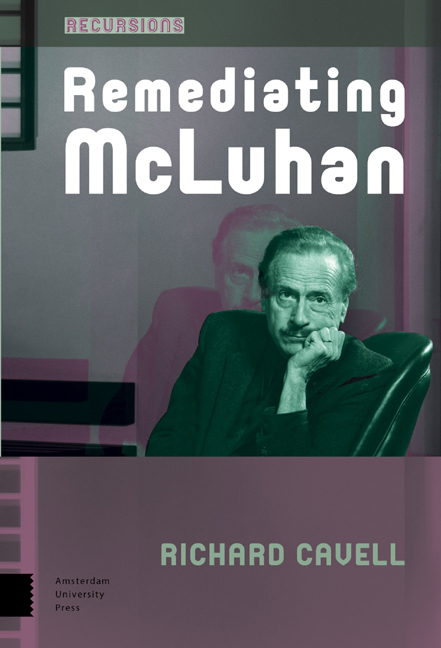Book contents
- Frontmatter
- Dedication
- Contents
- Introduction
- List of sigla
- I
- Re: Mediation
- 1 Beyond McLuhanism
- 2 McLuhan and the Question of the Book
- Embodiment as Incorporation
- 3 McLuhan and the Body as Medium
- 4 McLuhan, Tactility, and the Digital
- 5 Mechanical Brides and Vampire Squids
- Empathic Media
- 6 McLuhan: Motion: e-Motion: Towards a Soft Ontology of Media
- 7 Re-Mediating the Medium
- Determining Technology
- 8 McLuhan, Turing, and the Question of Determinism
- 9 Angels and Robots
- Being Mediated
- 10 Marshall McLuhan’s Echo-Criticism
- 11 McLuhan and the Technology of Being
- II
- 12 The Tragedy of Media: Nietzsche, McLuhan, Kittler
- Coda: On the 50th Anniversary of Understanding Media
- Notes
- Works Cited
- Index
10 - Marshall McLuhan’s Echo-Criticism
Published online by Cambridge University Press: 12 December 2020
- Frontmatter
- Dedication
- Contents
- Introduction
- List of sigla
- I
- Re: Mediation
- 1 Beyond McLuhanism
- 2 McLuhan and the Question of the Book
- Embodiment as Incorporation
- 3 McLuhan and the Body as Medium
- 4 McLuhan, Tactility, and the Digital
- 5 Mechanical Brides and Vampire Squids
- Empathic Media
- 6 McLuhan: Motion: e-Motion: Towards a Soft Ontology of Media
- 7 Re-Mediating the Medium
- Determining Technology
- 8 McLuhan, Turing, and the Question of Determinism
- 9 Angels and Robots
- Being Mediated
- 10 Marshall McLuhan’s Echo-Criticism
- 11 McLuhan and the Technology of Being
- II
- 12 The Tragedy of Media: Nietzsche, McLuhan, Kittler
- Coda: On the 50th Anniversary of Understanding Media
- Notes
- Works Cited
- Index
Summary
Today's ecological awareness is echo recognition.
McLuhan and Nevitt, Take Today: The Executive as Dropout‘Environment’ was the term employed by McLuhan in his elaboration of the way in which media attained epistemic status, becoming, in effect, the frame of reference for a given historical period. Although environmental groups such as Greenpeace (Dale, McLuhan's Children) take McLuhan as their progenitor, insofar as he provided them with a paradigm for the mediatics of environmentalism, McLuhan's ‘environment’ differed radically from theirs in that he rejected their notion of ‘nature’. Media had become the new environment in his argument, and media would be the only way out, through the creation of anti-environments. The gestalt dynamic of environment and anti-environment, which McLuhan formalised at the end of his career through the chiasmic principle governing his tetradic laws of media, constituted the ‘ec[h]o’ effect of his feedback theory of mediation, the ‘acoustic’ response to an increasingly narcissistic visual culture.
McLuhan adopted the term ‘environment’ from the artistic practice that we know today as the ‘installation’, an artwork that takes over an entire space, such as that of an art gallery, as ‘ground’, rather than being a ‘figure’ on the wall. Although the term environment does not feature largely in contemporary media theory—it is not listed in Mitchell and Hansen's Critical Terms for Media Studies—the notion of a media ‘ecology’ has returned media theory to a number of the concerns McLuhan sought to raise with the notion of ‘environment’, and especially to the notion of the ‘echo’ effect (and hence the pun in my title) whereby culture would come to dominate our concept of ‘nature’ as part of a recursive phase in which modernity could be understood as turning back on itself.
McLuhan's connection to this ‘environmental’ discourse came through Maurice Merleau-Ponty, and particularly Merleau's notion of ‘the flesh of the world’ (The Visible and the Invisible, p. 144) as articulating the interface of body and environment. This notion that a libidinal, affective economy underpinned cultural mediation was crucial to McLuhan's work from his first book, The Mechanical Bride (1951). That book was concerned with a ‘second nature’ comprised of the technological prosthetic.
- Type
- Chapter
- Information
- Remediating McLuhan , pp. 109 - 114Publisher: Amsterdam University PressPrint publication year: 2016



